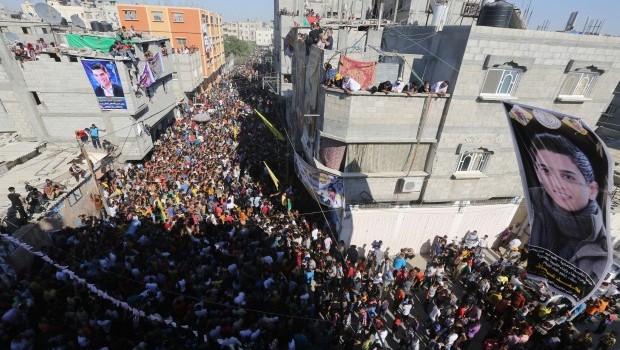
Fans wait for the arrival of Palestinian “Arab Idol” Mohammed Assaf in front his home in Khan Yunis town in the southern Gaza Strip June 25, 2013. Source: AFP Photo/Mahmud Hams
Beirut/London, Asharq Al-Awsat—Despite the fact that this is only its second year on the air, the series finale of Arab Idol received 100 million viewers, according to estimates by broadcaster MBC, propelling its winner, 23-year-old Palestinian Mohammed Assaf, to stardom.
Ali Jaber, Director General of MBC commented on the success of the Arab Idol show, saying: “I believe the secret to success is that we can put our finger on the pulse of the Arab and Gulf public. In particular, we have more experience than others in assessing the changing public desires. The public is like a school of fish; changing its direction for no reason. We have been able to keep up with these changing trends in a professional manner.”
“We have also seen a change in the viewers’ choices, especially after the events of the Arab Spring. The audience, which had accepted American films and escaped to the cinema, began to prefer public programs that it could effectively participate in,” Jaber added.
Although Arab Idol and other music competition shows are inspired by western programs, this has not affected the manner in which they are made in Arabic.
“It is true that these programs are a blend of western-made shows, but we must remember it has proven to be successful in 127 countries. Ultimately, the success is owed to Arabic culture . . . These shows provide the Arabic public with the songs of Umm Kalthoum, the poetry of Ahmed Shawqi, and the voice of Abdel Halim Hafez—more so than any programs,” the director general explained.
The official spokesperson and general manager of public relations and business affairs for the MBC Group, Mazen Hayek, speaking exclusively to Asharq Al-Awsat, said: “It is quite simply one of the main sources of the great Arab dream.”
Speaking about the political implications of the show, Hayek said that the show represented how dreams can be achieved, and could entice the whole Arab world to rid itself of the wars and revolutions and that, through art, peace can be achieved.
“I think there are several reasons for the success of the second season of Arab Idol,” Hayek continued. “Most notably, it forms a connection between Arab nationalities, without distinguishing between countries. The majority [of countries] are suffering acute political crises . . . When Abdel Karim Hamdan performed Mawwal Halab, we knew that it would touch the feelings of people from Syria and elsewhere, because of the Syrian crisis and what was being sung. People were crying, and the western media took note. CNN, the BBC, Le Figaro, the New Zealand Herald and other media outlets were talking about it at length.”
Asked why he thinks the show gained so much attention, Hayek replied: “From the Atlantic Ocean to the Gulf, Arab Idol gathered participants. It even achieved a kind of peaceful curfew in a number of countries when their participants were performing.
“It was also able to offer a higher production value than the first season. In addition to Nancy Ajram joining the panel of judges there were three artists that have a large base of popularity; Ahlam, Ragheb Alama, Hassan El-Shafei. This is not to mention the extraordinary voices that were participating in the show. There were 13 participants that we followed through the qualifying stages who were eligible to win. Perhaps social media was the largest evidence of the success of the work, since there was an overwhelming number of comments about the participants every day.”
On the topic of the number of viewers who tuned in to watch the show, Hayek said that they “do not have official statistics on the matter, but estimates indicate that the final attracted 100 million viewers. This is the highest figure we have ever achieved. The Turkish series Nour successfully acquired 85 million viewers on August 29, 2008, but Arab Idol exceeded all expectations. The program turned into a social phenomenon. The western media, during their coverage of countries with contestants, was surprised by what was taking place on the ground.”
The MBC official summed up the success of the show by saying that the winner, Mohammed Assaf, was a symbol of the triumph over adversity.
He said: “For Mohammed Assaf to win was the best example for young Arabs to overcome their sufferings. They can have faith that they do have the ability to achieve their dreams, even though their political surroundings and other problems have prevented them from doing so for many years. Even when it was announced that Mohammed Assaf had won, I felt that this humble and affable young Palestinian was surprised and shocked. He had not dared to dream. Because of the tragedies, wars, abuses, and occupation that he had experienced and suffered from, he did not believe that he had won.”

Trackbacks/Pingbacks